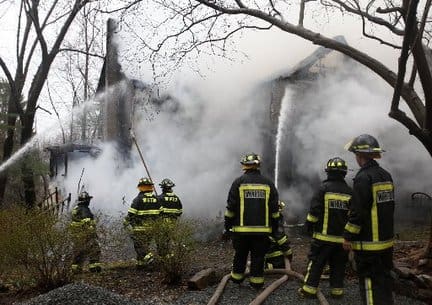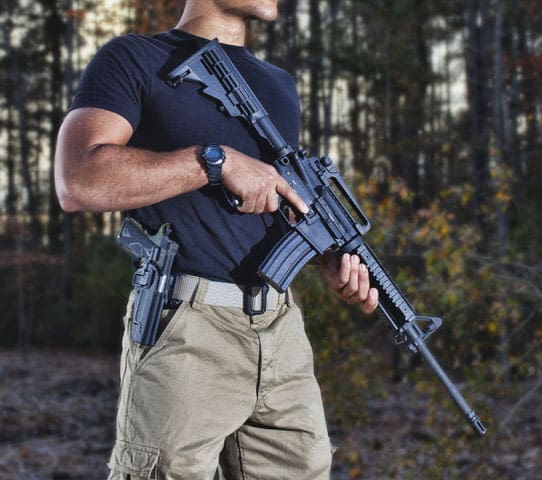I don’t know about you, but I sleep better at night knowing that I have a great deal of ammunition in-house. Zombie attacks, natural disaster-related social disintegration, post-apocalyptic hunt-for-your-food scenarios—bring it on. I have enough guns, bullets and shells to protect my family until, say, 2012. But seriously folks, a gun without ammo is like breakfast without orange juice—except potentially fatal. And you really need to buy another safe for your ammo. A fireproof safe. “The sound of exploding ammunition isn’t a reassuring sign to firefighters arriving at a burning home,” NJ.com reports with British understatement. “While there is not a lot of danger when unchambered ammo goes off, it hasn’t stopped the pop, pop of burning bullets from holding some worried firefighters at bay. It could serve as a warning that there might be other munitions in the home.” Ya think? Here’s an equally important piercing glimpse into the obvious: keeping firefighters at bay isn’t such a good thing when your house is on fire.
The state Division of Fire Safety and the New Jersey Firefighters Mutual Benevolent Association say they don’t know how often it happens, but in two incidents last month and once again this week, exploding ammunition hindered the efforts of firefighters, contributing to the damage done by the flames.
In Morris County’s Kinnelon, crews had already been having difficulty with a fire when “all of a sudden, there were rounds going off,” said Lt. John Schwartz, a police spokesman. By the time firefighters felt comfortable going inside, it was too late — flames were on all floors. The single-family home burned to the ground.
And in Perth Amboy, less than a week later, burning bullets led firefighters to use a high-power hose to pump water into the building from the outside.
“You would normally send the crews inside to get to the seat of the fire,” Perth Amboy fire chief David Polk said. With the sound of bursting ammunition ringing through the air, “you just can’t do it.”
See what I mean? No. Let’s be clear, then.
“You’d let the building burn down before you’re going to a put a firefighter in danger,” he said.
Keep in mind that perception is reality for these guys. ‘Cause the reality is that the only real danger here is if the bullets or shells are in a loaded gun, and probably not even then. As NJ.com points out.
Truth is, burning ammunition is typically safe for properly dressed firefighters to be around, said Steve Wolf, a pyrotechnics expert and special effects coordinator for Hollywood movies and network television shows. He’s worked on films that include “The Firm,” “Cast Away” and “Hustle & Flow,” has 23 years experience and is a certified firearms instructor.
“Generally, the way commercial ammunition is packaged, it doesn’t pose a threat,” said Wolf, who has experience setting fire to bullets. “It wouldn’t really be worse than going into a room filled with firecrackers.”
A burning box of ammunition will pop and spark. It can send small pieces of brass flying a few feet, but it’s nothing a firefighter’s protective clothing wouldn’t stop, Wolf said. The jackets and pants fire brigades wear are made with kevlar — the same material used in body armor.
Never mind. Bottom line: you need a separate safe for your ammo—’cause you don’t really want your house to burn to the ground and I just KNOW you have too much ammunition to store in your gun safe with your guns. While really heavy, well-insulated and expensive safes offer maximum fire protection, it seems a bit silly to spend big bucks on a home for bullets. And asking a gun enthusiast to buy another gun safe just for his ammo is like asking a cigar lover to buy a humidor to keep his matches dry.
So you have three choices.
One: store the ammo in a locked space away from the main house. Some gun owners keep their ammo locked in their garage or other outbuilding. Unfortunately, ammo likes a clean, dry, temperature-regulated environment. And dud ammo really, really sucks.
Two: bite the bullet, buy a proper gun safe, spread-out your gun collection and ammo, and resist the urge. The new-for-2010 Browning Theftguard is my favorite under-a-grand choice for long gun/handguns and ammo. It’s fireproof for 30 minutes at 1200 degrees. I’d stick with Browning for a smaller handgun/ammo safe. The Compact Series is a bi-layer box that’s good for 45 minutes at 12000 degrees.
Three: buy a non-gun specific fire-resistant or fireproof safe. A good one runs from roughly $650 to yes, a grand.
I know: it’s expensive. But you heard the man: your ENTIRE HOUSE is at risk. If you’re looking to save some money, there’s a healthy used safe market. BONUS! An ammo safe keeps the bad guys from getting bullets. WARNING! You’ll eventually fill whatever storage space you have with something. That’s just the way it is.





SAAMI has some pretty good videos on this topic.
I don’t know if they’re trying to make them “profit center” items, or they will permit reproduction, but it seems to me that one way to combat firefighter ignorance is through education. For the cost of a SAAMI video, plus a couple bucks and an hour or two of time, you could run off a half dozen copies and provide them to all your local fire departments (assuming SAAMI is okay with that). Guys in the station house generally have long hours of nothing to do. The videos are entertaining enough and contain such important information, odds are, they will be watched.
The difficulty problem is that every method has problems
– fireproof safes are imbedded with moisture holding material and have high humidity. That is VERY bad for both guns and ammo.
– safes in general are unsafe for ammo because containing the expansion is what causes large explosions.
– if kids are present, for legal protection you ammo is best in a safe.
– advocacy by gun control nuts targeting ammunition (taxes, limits, hassles, lead issues) mean the wise choice is to stockpile ammo in very large amounts.
There is no good choice.
Even though you might feel you can self move, most likely it’s really
a massive burden, particularly if you are property is far away from where
you are transferring from. Have you decided that a move in surely on the cards.
Her brothers – who consider themselves white – continue to refuse any contact with her.
Finally, it is important to remember that the country that you want to relocate to may have local laws and regulations that
will apply in your case and it is best to choose a company that
has experience of this. When water quality and complying with
EPA standards became an issue, the village opted for obtaining water from
the Troy public water system.
Why not use those fire proof lock boxes that people use for important documents and things? They are cheap so you can buy a few (or many) of them if you need to. I have been watching a bunch of reviews and tests on them and the sentry ones seems to be very effective for personal belongings and even electronics. I don’t know if it would work for amo, but it’s a thought.
Comments are closed.